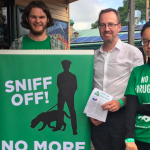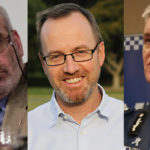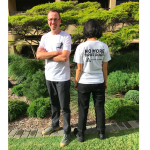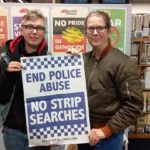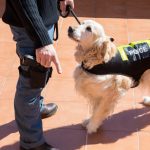Ditch the Dogs: An Interview With Sniff Off’s David Shoebridge
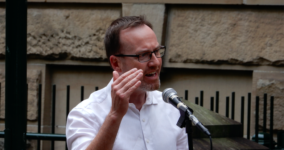
The leaked recommendations of the NSW coronial inquiry into music festival deaths suggest that sniffer dogs be abolished at these events, as the evidence points to “a link between the use of drug dogs and more harmful means of consumption”.
NSW deputy state coroner Harriet Grahame listed the risky drug-taking practices that young people use in order to avoid being indicated by a drug dog as “double dosing, pre-loading, swallowing drugs and insertion in a vaginal or anal cavity”.
The devastating aspect to these scenarios is the dogs are notorious for getting it wrong. So, in cases where, on spotting police, a festivalgoer has panicked, swallowed all their drugs at once and overdosed, the dogs might just as well have let them pass and indicated someone else.
The inquest investigated the circumstances surrounding the drug-related deaths of six young people at NSW festival events between December 2017 and January this year. And the leaked document recommends, not only pulling back on the heavy police presence, but implementing pill testing.
Get sniffed
The warrantless use of drug dogs in public places began in the lead up to the 2000 Sydney Olympics. And in early 2001, the initial fourteen canines were reassigned to work at various NSW police local area commands, with the stated aim of cracking down on drug supply.
The legitimacy of drug dog operations was called into question early on, with the release of the 2006 NSW Ombudsman sniffer dog report, which found that the dogs got it right only 26 percent of the time, and in the majority of those cases, they turned up small amounts of cannabis for personal use.
NSW Greens MLC David Shoebridge and the NSW Young Greens launched anti-drug dog campaign Sniff Off in 2011. And it’s been monitoring the police figures relating to dogs going back as far as 2009.
These statistics reveal that on the overwhelming majority of occasions a drug dog does indicate that a citizen might be in possession of an illicit substance, the subsequent search turns up no illegal drugs whatsoever.
Institutionalised assault
More recently, Mr Shoebridge and Sniff Off have been monitoring the use of strip searches by NSW police. As revealed in July last year, officers had basically doubled the number of strip searches they’d conducted following a positive dog indication over the two years 2016 and 2017.
Indeed, just this week, the Law Enforcement Conduct Commission announced that it had heard evidence from a senior constable, who admitted to conducting 19 unlawful strip searches – which turned up a single Valium – at last year’s Splendour in the Grass music festival.
Sydney Criminal Lawyers spoke with David Shoebridge about his thoughts on the coronial recommendations, recent sightings of drug dogs being deployed in suburban shopping malls, and the fact that large numbers of searches are currently being carried out unlawfully.
Last week, leaked recommendations revealed that the NSW coroner is set to suggest that police bring a halt to the practice of using drug dogs at festivals. What do you think about this development?
We support the thrust of the coroner’s recommendations about reducing the aggressive police presence and moving towards pill testing.
But, we were surprised to see that the NSW government – almost certainly the NSW police – saw fit to release confidential draft recommendations.
This is police engaging in politics. And that’s always dangerous.
Sniff Off has been campaigning against the warrantless use of drug dogs in public places since 2011. And it’s been collating the police statistics going back as far as 2009. What are the stats telling us at present?
What they’ve shown consistently is between two-thirds and three-quarters of searches following a drug dog indication find no drugs. Indeed, they find nothing.
The hit rate is slightly higher at music festivals. They get it wrong about 50 percent of the time at festivals.
What we can say is that the police drug dog unit has no impact on reducing drug supply, across the state, at music festivals, or even in NSW prisons.
It’s a failed program that’s main outcome is damaging people’s civil liberties and damaging the relationship between young people and the police.
Recently, there have been sightings of NSW police conducting drug dog operations in suburban shopping malls. What do you think about this tactic?
This is the most obvious example of policing as PR, rather than having any pretence of tracking down drug dealers or reducing drug supply.
The idea that anybody would be performing any kind of significant drug deals inside of shopping centres – when inside there is wall-to-wall 24-hour closed-circuit television – is laughable.
This is an appalling waste of resources. And yet, another intrusion on people’s day-to-day lives.
The Redfern Legal Centre’s Samantha Lee passed on a screenshot last week from the NSW police testing manual. It states that a positive dog indication alone is not enough to warrant a reasonable suspicion to search a person.
Do you think in the field that officers are regularly operating under this assumption?
We made public the police standard operating procedures some years ago. And they’ve always said – in fact, in bold type – that a drug dog indication is not of itself sufficient reason to search somebody.
However, the reality is police routinely use the bare indication from a dog as a sufficient basis to conduct first of all, an initial personal search, and then a strip search.
The Greens don’t believe we should be handing over our civil liberties to the opinion of a dog.
The NSW coroner also recommends that along with ditching the dogs, police should refrain from searching festivalgoers. There’s been a sustained campaign to see police stop strip searching the public both at festivals and elsewhere.
Do you think there are any signs that police are slowing down on this procedure of last resort that’s now become routine?
From the material and the evidence I’ve seen, police are doubling down on their strip searches.
Indeed, the police commissioner went to the point of telling untruths to a parliamentary inquiry about police strip searches, as a way of trying to defend them.
As recently as a few weeks ago, when I attended the Yours and Owls music festival, there was a very aggressive police presence.
There were dozens of police vehicles. Dozens and dozens of police. At least two drug dogs. And even police riding around Stuart Park – on the northside of Wollongong CBD – on dirt bikes.
The police are not getting the message, which is now coming from a broader cross section of the community, that this kind of aggressive policing is not on.
About a month ago, NSW police released its updated search manual. It shows that officers are specifically operating under protocols that include asking those being strip searched to squat and cough, part buttock cheeks and lift testicles, which are acts that aren’t in the legislation.
What do you think about the manual specifying procedures not contained in the legislation?
The most recent police search manual is encouraging police to engage in grossly humiliating conduct, which is almost certainly unlawful.
The legislation does not give the police the power to humiliate people while they’re naked by asking them to spread their buttocks or lift their testicles.
The fact that the police search manual continues to empower police to do this shows just how committed they are to the unlawful and aggressive use of strip searches.
And lastly, how do you expect the Berejiklian government to respond to the recommendations of the coroner’s report once it has been officially tabled?
We’ve already seen a PR campaign run by the police after leaking the draft recommendations to try and stop the Berejiklian government accepting the coronial recommendations in good faith.
That’s a shameful engagement in politics by the NSW police.
But, there’s no doubt, it’s had some effect, because the Berejiklian government already seems to be indicating that they won’t accept the coroner’s recommendations.
Once again, we’re seeing politics – and indeed the NSW police – get in the way of evidence-based policy.



